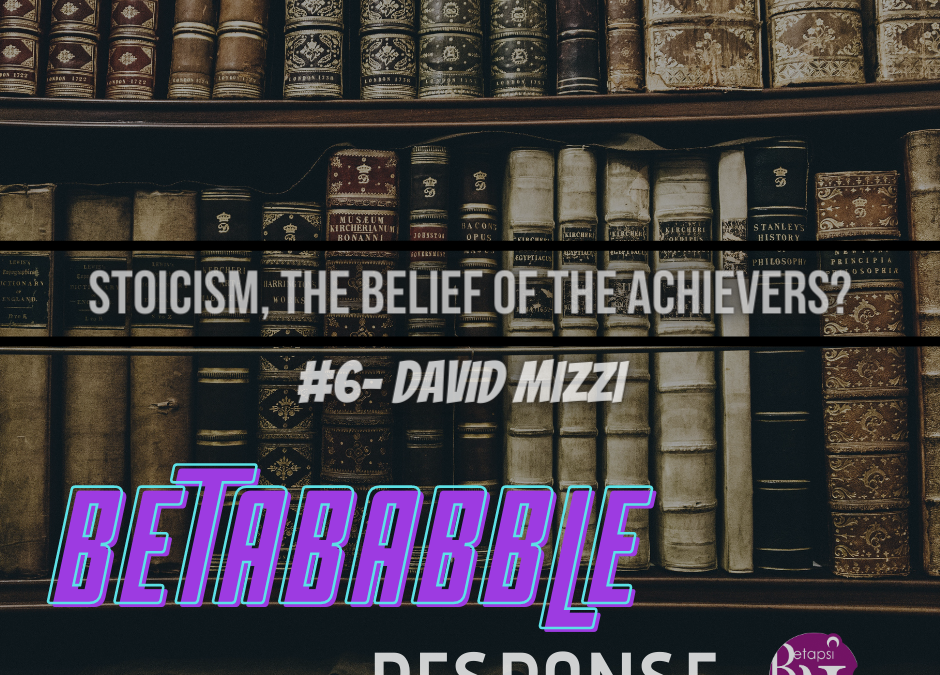The teachings of Stoicism have been followed by both Emperors (Marcus Aurelius)
and slaves (Epictetus) alike. It has provided solace for statesmen (Seneca) and
senators (Cato).
But does a 2,000-year-old philosophy have anything to teach us in
the modern age?
Clayton rightly pointed out the basic element of Stoic philosophy in Betababble #3,
“although we might not have full control over events that affect us, we do in
fact have control on how we choose to look at things.”
For Stoics, the true end of man is a life of ‘virtue’ (the English word ‘virtue’ does not
do justice to the Latin term virtus which connotates a combination of wisdom [moral
insight], courage, self-control and justice [upright dealing]) (Seneca & Campbell,
1969). This is achieved by living according to nature’s laws. When we say nature’s
laws this includes resigning oneself completely and uncomplainingly to whatever
fate sends us.
Of course, this doesn’t mean sitting back and doing nothing. But it does show us
a dignified way of dealing with the tribulations and unpleasant surprises fortune has
in store for us.
Seneca makes this quite clear in Letter LIV – “[…]there is nothing the wise man does
reluctantly. He escapes necessity because he wills what necessity is going to force
on him.”
While a rudimentary glance at Stoicism might suggest that it advocates a cold and
unfeeling demeanour, Stoicism has a lot to teach us about our own mental well-
being.
In Letter VI, Seneca refers to Hecato of Rhodes (another Stoic Philosopher) who
tells us to “be your own friend.”
Just as we try to help our friends become better people, we ought to try and help
ourselves become better versions of ourselves. This entails being comfortable
with who you are. Learning to love yourself. Being comfortable in your own skin. You
cultivate an openness with yourself – your darkest and inner-most thoughts are no
longer a source of shame or fear. But rather, they become a confession, a sharing of
troubles with a trusted companion.
Observe your own behaviour, so you may learn from it. Take note of what you
admire, as well as the attributes you wish to improve. This allows you to shift your
attention away from things that are beyond your control, focusing instead on
that which is within your control – your behaviour.
This ties into what Dr Paulann Grech says about reflection. “The reality is that
reflection is not rocket science – the real challenge is finding the time to do it!”
The act of reflection allows us to stop, consider our thoughts and actions, and
change what we are unhappy with.
By getting into the habit of observing our own thoughts and behaviour, and reflecting,
we can cultivate a sense of mindfulness, of being present in the moment.
Seneca makes this quite clear by quoting Epictetus in Letter XV – “The life of folly is
empty of gratitude, full of anxiety: it is focused wholly on the future.” Being consumed
about what will happen in the future only serves to riddle us with anxieties about
things which have not (and might not) come to pass. Rather than concerning
ourselves with fickle Lady Fortuna, we ought to concentrate on that which is within
our control – the present.
Of course, Stoicism’s teachings tackle other concepts – such as how to stay in
control of our thoughts, dealing with sickness and death, and overcoming anxiety.
This was the remit of schools of thought such as Stoicism – to provide a practical
guide to living. The lessons they have to offer will continue to inspire countless
people for many more generations.
Further Reading
Seneca, L., &; Campbell, R. (1969). Letters from a Stoic. Penguin.
David Mizzi


